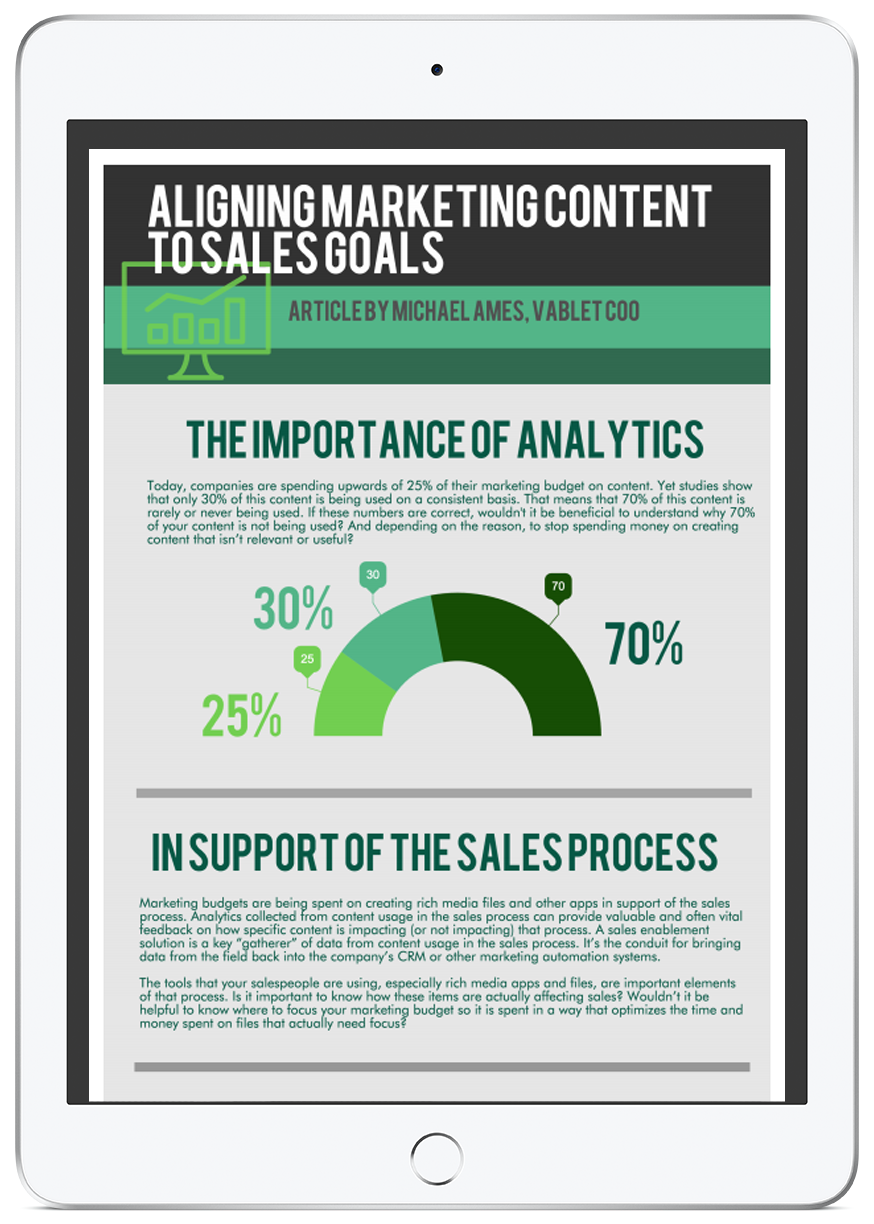Easily connect to the systems you rely on most.
vablet provides easy integration with your most important marketing and business platforms such as CRM, BI tools, ERP, Automation, and storage platforms.

Explore vablet’s Platform Integrations.
CRMs
Integrate with leading CRM platforms like Salesforce, Veeva, and SAP to automate tasks and eliminate busywork.
Active Directory & SharePoint
Harness corporate IT ecosystems like Microsoft Active Directory and SharePoint. Manage users and assets going in and out of vablet automatically. Maintaining permission’s across your environment.
Cloud Storage
Leverage Microsoft’s Azure and AWS, SFTP, VPN and hybrid content storage environments, as well as solutions like Box, Dropbox, and Google Drive.
APIs
Simplify the way you control devices, share content, and collect and distribute analytic data with powerful APIs for XML/SOAP programmers and in RESTFul/JSON.
BI Solutions
Push data into your business intelligence solutions such as Tableau and Power BI. Enhance your reporting capabilities seamlessly.
And Many More…
Integration with your MARCOM stack has never been easier. Pushing and pulling, updating and reporting are all easy with vablet.
Get More Value From Your Salesforce Investment.
vablet’s native integration with Salesforce creates a seamless experience for your field reps. Update calendars, contacts, opportunities, events, leads, and other custom objects quickly (on or offline). Record sales engagement activities automatically into Salesforce and leverage custom HTML apps that capture real-time data that is recorded in Salesforce. Also, vablet takes Salesforce offline on any Windows 10 device too, not even Salesforce can do that!!

Seamless integration provides benefits across your business.
Seamless integration with different platforms such as ERP (Enterprise Resource Planning), CRM (Customer Relationship Management), Marketing Automation, and Business Intelligence is crucial for enterprises seeking to enhance their efficiency, productivity, and strategic decision-making capabilities. Here are some key reasons why an enterprise would want to integrate these diverse platforms:
Streamlined Operations
Integration facilitates the seamless flow of information across various departments and systems. This eliminates the need for manual data entry and reduces the likelihood of errors, ensuring that all teams work with accurate and up-to-date information.
Competitive Advantage
In today’s competitive business environment, having integrated systems can provide a significant edge. By leveraging integrated data and analytics, enterprises can identify market opportunities, optimize pricing strategies, and deliver superior customer value.
Improved Decision Making
Data from sales engagement activities, integrated with other platforms, provide valuable insights by analyzing data from multiple sources. This enables decision-makers to identify trends, uncover patterns, and predict future outcomes more accurately.
Improved Regulatory Compliance
Integration helps in maintaining control, consistency, and accuracy of data, which is crucial for regulatory compliance. Media usage data from a Sales Enablement system can be reflected in reports generated by a BI tool, ensuring compliance with regulatory requirements.
Increased Productivity
Integration reduces the time spent on administrative tasks and data management, allowing employees to focus on more strategic and value-adding activities. Automating Sales Enablement data with your CRM ensures that marketing efforts are aligned with sales goals
Enhanced Collaboration
Integrated systems foster better collaboration among different departments. With access to shared data and insights, teams can work together more effectively to achieve common goals.

Why is System Integration So Important?
If you’re interested in learning how integration between the right marketing and sales technologies can drive marketing and sales alignment, check out our article.